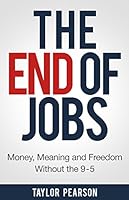Highlights from "The End of Jobs"
By Taylor Pearson

What if the better question is: “How do I create a job doing that?”
The number of individuals looking for jobs, hoping to follow someone else’s orders, are growing exponentially.
It’s the work of understanding and operating in the complex and chaotic systems—entrepreneurship—that’s increasingly in demand.
If you’re trying to grow a business, there’s always a primary limit preventing that. If you have an amazing product and no one knows about it, improving the product won’t help it sell more.
“If I had an hour to solve a problem, I would spend 59 minutes asking the right questions,”
Limits can be applied to any system in order to dramatically improve the outcome without having to dramatically improve the inputs.
We aren’t going through a global recession—we’re transitioning between two distinct economic periods.
knowledge, they’re going back to school to get more credentials. Even as the returns on credentials are declining, still students continue to pay more and more for them.
we frequently avoid making choices not because the outcome is bad, but simply because it’s unknown.
We assume jobs are safe because they’ve always been safe, not because there’s good evidence they will be in the future.
The longer the market goes without having a correction, the larger the correction will be when it happens. The longer we go in our careers and businesses without variation or randomness, the larger the amount of underlying risk we accumulate.
provide in terms of marketing. What
Because technology develops faster than biological systems (like our brains), we’re not very good at understanding these kinds of changes, but they happen all the time in the modern world.
In a world without the internet, where information was expensive and the only way to learn was to get a degree, that made sense. In a world with the internet, where information is rapidly approaching free, it’s hard to rationalize spending money paying for access to general knowledge when you can get the same knowledge for free.
launching a product that sells for a one-time fee
you can start to expand your toolbelt of relationships and skills.
Instead of working nights and weekends like you had been, you’ve got 40–60 hours a week to put in on your business, giving you a platform to launch bigger products, and projects from.
Experienced entrepreneurs frequently deal with “shiny object syndrome,” a phenomenon where they see too many opportunities and have too many ideas, and not enough resources to pursue them.
More wealth leads to larger families, which needed to be fed. A cycle of increasing family size and community requiring more material wealth began.
The Greeks also saw work as a curse. The Greek god of hard labor was Ponos, taken from the Latin poena for sorrow. Manual labor was for slaves, and hard work was looked down upon.
Plato and Aristotle believed work was for the majority so that the elite might “engage in pure exercises of the mind—art, philosophy, and politics.”
an increase in sheer quantity of hours failed to generate more wealth creation or greater productivity.
Because it led to a better overall quality of life, we’ve accepted work as a disutility because it was necessary to survive as a society and a worthy trade-off for us as individuals.
Money is really just a proxy for general material wealth, but it’s a pretty accurate proxy and medium of exchange.
If we can structure meaning and freedom into our work now, we see the Tom Sawyer Effect—work goes from being an obligation to a choice.
As the Industrial Revolution proved, we can make more money and more wealth. We still haven’t invented the ability to make more time.
Jobs not only limit the upside of intrinsic value by tying money to time—they also give up control. We have no leverage beyond trading more time, which is our most valuable and only truly limited asset. We lose control to react to market forces outside the scope of the job.
It’s cheaper, easier, and safer to start a business. When you grow it using variables you control, you make more money because you have unlimited leverage.
“There is only one success—to be able to spend your life in your own way.”
I believed in “building businesses to create more freedom and wealth in your life and the lives of those you love.”
The Baby Boomer generation built the knowledge economy, which gave them more free time and the discretionary income to enjoy it than their parents’ generation ever imagined.
The entrepreneur defines reality, he is not defined by it. He is engaged in a dialogue with his reality asking “why” and “why not” instead of “how” or “what.”
It doesn’t depend on outside events, but our interpretation of them. Happiness is a condition which can be prepared for and cultivated.
The most talented and ambitious young people, when they feel under-utilized in the jobs, shrink to fit their position.
Entrepreneurship expands your power to design your life. You are a part of the first generation that has radical access to the tools of production. Rather than choosing from a set of options, you can design your own.
The blank screen, the blinking cursor. Write, young man, write.